Textile state senators have added key elements of the domestic industrys trade agenda to
legislation granting President Bush expanded trade negotiating authority. The amendments to the
Trade Promotion Authority Act (TPA) would require other nations to open their markets to textile
and apparel exports and also to protect United States anti-dumping laws, which the textile industry
frequently has used to combat unfair trade practices.An amendment sponsored by Sen. John Edwards
(D-N.C.) would write into law the negotiating objectives of the domestic industry in connection
with the current World Trade Organization (WTO) trade liberalization talks and any other bi-lateral
trade agreements. The Edwards amendment states the “Principal negotiating objectives of the United
States, with respect to trade in textile and apparel articles, is to obtain competitive opportunity
for United States exports of textiles and apparel in foreign markets.” To accomplish this, the
amendment would require other nations to reduce their tariff levels to the same or lower levels as
the U.S. by a certain date and eliminate non-tariff barriers to trade in textiles and apparel. The
amendment, co-sponsored by Senators Max Cleland (D-Ga.), Zell Miller (D-Ga.), George Allen (R-Va.),
Blanche Lincoln (D-Ark.) and Jesse Helms (R-N.C), was approved by a substantial margin of 66 to 33.
Van May, president, American Textile Manufacturers Institute (ATMI), praised the senate action. ”
The senate recognizes that fairness must be a key objective in textile trade negotiations, and by
adopting the Edwards Amendment, the senate has served notice that the U.S. textile industry is not
to be given away in future trade talks,” he said. In a related development, the senate adopted
another amendment that would exempt U.S. anti-dumping, countervailing duty and other trade remedy
laws from the so called “fast track” procedure whereby trade agreements cannot be amended by
Congress. The amended version of the TPA bill provides that if any trade agreement negotiated under
fast track procedures includes changes to U.S. trade laws, the proposed changes would be subject to
regular congressional procedures, including full debate and amendment. That amendment was a major
setback for the Bush administration and importers who believe it undercuts their ability to
negotiate trade agreements.The senate is expected to pass the final version of the bill by its
Memorial Day recess starting May 24, and the bill would then have to be reconciled with an already
approved House version of Trade Promotion Authority.
Senate Supports Textile Industry Trade Agenda
Inventa-Fischer Awarded DuBay Polymer Contract
Germany-based DuBay Polymer GmbH, a joint venture of DuPont and Bayer AG, has awarded a contract to
Berlin-based Inventa-Fischer GmbHandCo. KG to build a turnkey plant for the production of
high-viscose polybutylene terephthalate (PBT) in Hamm Uentrop, Germany. The project is valued at
more than 50 million euros.Inventa-Fischer, a subsidiary of Switzerland-based EMS-Chemie Holding
AG, will supply the technology, engineering, equipment, plant control, building, infrastructure and
utility distribution for, as well as erect and commission the continuously operating
polycondensation plant. Using Inventa-Fischers modern two-reactor process technology, the plant
will produce 80,000 tons per year of PBT, which is used in molded composites for the automotive and
electronic industries.
May 2002
ATMI Focuses On Trade
ATMI Focuses On Trade
Will Washington keeps its promises Textile executives attending the American Textile
Manufacturers Institute (ATMI)s 53rd annual meeting heard repeated promises from government trade
officials and members of Congress that they are strongly committed to carrying out President George
W. Bushs nine-point program to help the ailing textile industry, but many members remained
skeptical. In the major address of the annual meeting, Secretary of Commerce Donald L.
Evans said: I want you to know that you have a friend in us and you can trust us to keep our word.
When George W. Bush makes a commitment, we know he will honor that commitment.After hearing the
repeated promises, outgoing President Charles A. (Chuck) Hayes said: The proof of the pudding is in
the eating.Last December, the Bush administration, in response to pressure from textile-state
congressmen, outlined a nine-point program that includes a commitment to seek greater overseas
markets for U.S. textiles and apparel, resistance to liberalizing U.S. import quotas, a crackdown
on illegal imports and tax relief.
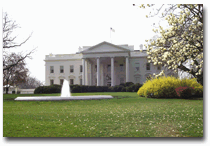
Washington provided the venue for this year’s ATMI annual meeting. Evans Promises
SupportEvans said the administration already has taken some steps to fulfill that commitment, and
others will be forthcoming. Some, however, will require congressional action, and that could prove
to be the most difficult and contentious area. He said the tax carryback provision of the economic
stimulus package passed by Congress and signed by the president should help address what he called
the textile industrys severe liquidity problem. Although the textile industry had wanted to recover
taxes paid in profitable years going back 10 years, the final legislation provided for a five-year
carryback, which the industry views as a major improvement over the current two years. Evans also
said the administration is resisting an effort by some developing countries to have the 2005
textile quota phase-out accelerated. We have said no consistently, and we will continue to say no,
he said.We have promised we are going to work aggressively to open markets for you, Evans said. It
is time to get other countries to knock down their barriers. We no longer will settle for just
words; I want results. Evans said the administration is equally committed to enforcing laws and
regulations combatting illegal transshipments, smuggling and copyright violations. I want to send
everyone concerned a clear message, he said. This president is for free trade, but he also is for
fair trade and a level playing field. We are going to demand that countries live up to their trade
agreements, and we will enforce our trade laws. Will Promises Be KeptIn a closed meeting of
the ATMI Board of Directors, two of the administrations key trade officials David Spooner, special
textile negotiator, and James C. Leonard, deputy assistant secretary of commerce for textiles and
apparel and consumer goods were peppered with questions about their determination and ability to
carry out the administrations textile trade commitments. While many of those attending the meeting
were impressed with the textile trade team, some said they have nagging concerns because of the
failure of previous administrations to follow through on commitments made to the industry. ATMI
Executive Vice President Carlos Moore said that while ATMI has a thick file of broken promises,
many of the promises were made by presidential candidates, who, once they got into office, were
unable or unwilling to follow through. The difference in this case, Moore said, is that these
commitments have been made by an incumbent president.
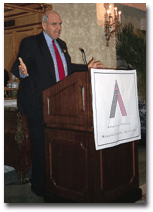
As the administration was making its case, members of Congress from textile-producing states
assured those attending the meeting that they will use everything at their disposal to ensure that
commitments are fulfilled. Rep. Robin Hayes, R-N.C., who has been under heavy fire in his home
district for his crucial vote granting Trade Promotion Authority to the president, reminded the
textile executives that as a result of that vote, he was able to extract concessions from the
administration to address some of the textile industrys economic problems. I have signed agreements
from the secretary of commerce, with the concurrence of the president, and commitments from the
Republican leadership in the House that they will support positions we have been advocating and
help bring about fair trade, Hayes said. We have the word of the president and the speaker of the
House, and I believe both are men of high faith, and that is the single most important indication
they will keep their word. I want to assure you that I will fight with all of the power in my being
to see that these commitments are met. While textile industry leaders and members of Congress are
willing to give the administration the benefit of the doubt, at least for the time being, they are
wary of concessions that might be given to Asian nations in return for their support of the U.S.
war on terrorism. The United States already has given Pakistan a $480-million increase in its
apparel imports over the next three years, and Pakistani government leaders have indicated this
might be only a first step. Several other nations already have lined up for similar treatment. Rep.
Virgil Goode Jr., Ind.-Va., told ATMI members, to a resounding burst of applause, that the
government should reward its friends with a direct Department of Defense appropriation rather than
textile trade concessions. Looking Back

Outgoing ATMI President Hayes described his year as head of the industrys central trade
association as hell on wheels, as the industry faced its most adverse business conditions of his 50
years in textiles. In spite of difficulties, he cited a number of positive accomplishments that
could help the industry work its way out of its current economic slump. He said the Congressional
Textile Caucus has been retooled and reactivated; the industry has been successful in getting its
message across through the news media and with one-on-one meetings with government officials; and
it has letters from top government officials saying they understand the industrys problems and are
committed to doing something about them. Hayes noted that he had several meetings with the commerce
secretary and other government trade officials, and he is convinced Commerce Secretary Evans is a
true friend of the industry.Hayes warned that something must be done about the strong dollar, which
has made imports cheaper and exports more expensive, but no one at the meeting seemed to have a
simple or immediate solution to that problem. Looking ForwardStating that he is a consensus
builder, incoming ATMI Chairman Van May, CEO of the Plains Cotton Cooperative Association (PCCA) in
Lubbock, Texas, said he brings a new perspective to some of the textile issues, and he hopes to
link good farm policy and good trade policy. He strongly denounced the U.S. governments one-sided
trade policies that have opened the door to ever-increasing imports, while failing to open overseas
markets.
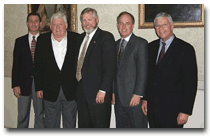
Left to right: Joe Gorga, Chuck Hayes, Van May, Billy Moore and Carlos Moore He said it
is absolutely unfair that countries such as India can ship millions of dollars worth of textiles
and apparel to the United States, while keeping its markets virtually closed. Our trade policies
have been so unfair, our biggest export is jobs, he said
(See Dont Mess With Texas, TW, March 2002).Looking at the agenda for the coming year, May
said one of his goals will be to work with government officials to develop a model for all future
trade pacts that will protect the interests of all segments of the textile industry.
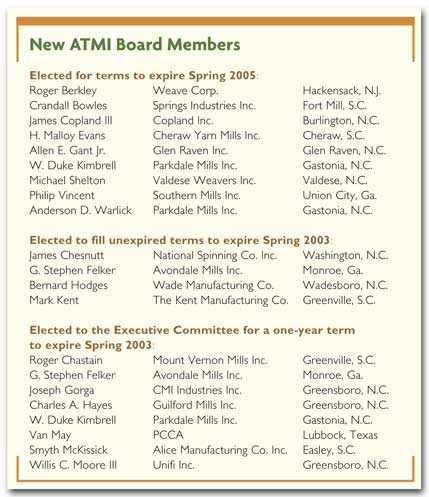
May 2002
Partners In Textile Innovations
Partners In Textile Innovations
Textile finisher brushes, crashes and embosses added value to a variety of
fabrics. Here and there, in villages, towns and cities all across the country, small,
responsive textile companies are surviving even thriving. These companies are usually owned and run
by only one or two people, and are especially adept at shifting gears and responding to customer
needs. These are companies such as Partners In Textile Innovations LLC (PTI), a contract finisher
in Piedmont, S.C., that didnt even start up until trade imbalances had already dealt the mainstream
U.S. industry a roundhouse knockout punch. PTI looks at the holes in the market and rushes to
fill them. Its all about innovation and being responsive to the needs of the customer, said Steve
Durham, the companys managing director. Its about adding value and providing something faster,
better and more innovative than others are willing to do.PTI was created in 1994 with the mission
of better meeting customer needs in texture finishing through the use of advanced technologies and
processes, Durham said. As a multinational company, with partners in the United States, Germany and
the Netherlands, our international reach expands the resources available for consistently and
continually fulfilling our mission to better meet customer needs, he said.
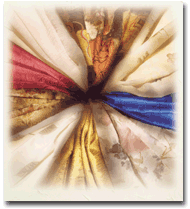
PTI was the first company in the United States to develop a process for crashing
fabrics. When creating the company, our mission led us to construct a new 50,000-square-foot
building rather than retrofitting older textile facilities, the course taken by most of our
competitors. We were able to build our new facility around cutting-edge technology, rather than
adapting or compromising the technologies to accommodate the facility. A key advantage of the
facility and equipment is the capability to finish wide goods up to 140 inches. Unique
FinishesOf the various finishes PTI features, it is perhaps best known for crashing. The company
was the first in the United States to develop the process and continues to refine it to the point
that PTI continues to offer the widest array of designs in the industry, Durham said. Crashing
textures available include crinkle, pebble, antique, spider, combo and long crash.PTI is also adept
at brushing, he said. Weve given brushing a feel long thought impossible. Customers want a soft,
pure-cotton feel from less expensive poly/cotton blends. Existing techniques would have severely
weakened or discolored the blends, so we began a re-evaluation and experimentation program that led
to the development of a new process that uses a custom-designed brush loom. Our proprietary
technique brushes less expensive poly/cotton blends into the feel of expensive, high-quality
imported cottons, while preserving fabric strength and color.All brushing techniques by the company
are available for wide fabrics up to 135 inches.Our whole business is based on making something
appear and feel more expensive than it really is, said Geoff Hollings, a partner in the business,
now retired. The perceived value of the goods is greatly enhanced by our processes.Yet another area
in which the company excels is embossing. Customer needs again led us to break free and surpass
industry process constraints, Durham said. They wanted a finished design that combines embossed
material and fine, sheer fabric. We pioneered a new process that embosses using infrared
technology. It allows combination fabrics to be processed as one piece because there is no damaging
heat, and the infrared is directed and limited only to the desired sections. The technology also
allows the embossing of wide goods of up to 135 inches. Getting StartedThe company had its
beginnings in another company, one that made draperies for the hotel industry. Durham and Hollings
were coworkers, and both were looking for new ideas upon which to base a start-up enterprise. We
saw a lot of fabrics coming in from abroad with new textured finishes, Durham said. All of it was
very expensive and no one was doing it over here, so we started this plant to do it
ourselves.Rather than looking for machinery that could be adapted to provide the desired effects,
Durham and Hollings designed and built their own equipment and began working on achieving the
finishes they wanted. Once we got it to an acceptable price, we found out a lot of people were
interested in what we were doing.Of all the end applications serviced by PTI, window treatments
account for about 70 percent of the companys business; bedding, about 20 percent; apparel, 5
percent; and industrial, 5 percent.Some of the designs heat-set, rolled, or otherwise imparted to
fabric at PTI can be seen in womens apparel particularly dresses, gowns and formal attire. You now
see the effects in every store, Durham said. It is just a matter of time, if you have a successful
process, that it is copied. Our mission is to do it better, deliver it quicker and keep the
customer happy. Of course, a great deal of our effort goes into research and development, and being
able to provide customers with looks and feels they cant get anywhere else.The company currently
has two new processes in development for apparel, including a denim application that will create
custom looks on a continuous form.Innovation is the key, Hollings said. You have to stay ahead of
the game. Indeed, innovation is so important to PTI that Durham and Hollings included the word in
the companys name. The other big word Partners applies not to some silent owner, but to the
customers to whom PTI delivers its goods. Our customers are our partners. To maintain business, to
see it grow, we have to maintain partnership relations with both our customers and suppliers,
Hollings said.The key for long-term profitability for PTI, both Durham and Hollings say, is to
continue the companys focus on design and marketing. Those two things are really our biggest
strengths, Durham said. You have to be continually looking at the customer and finding out what the
demands are. So far, we have been able to stay ahead of the competition, and we plan to continue
doing so. Of the fabric finished by PTI, Durham estimates that about half is domestic and half
imported. While PTI may invest a considerable portion of its earnings in product development, it
doesnt have to shell out substantial sums for market development. Our business is market-driven,
Durham said. Our customers come to us and tell us what they want. Then we take the customers ideas
and bring them to a product standpoint very quickly.To facilitate customer loyalty, the total range
of services provided by PTI has changed drastically over the years. From pure contract finishing,
the company now engages in sourcing, service, design, research and development, and product
development.Basically, our philosophy is to do whatever it takes to make our customers happy, said
Durham. If our customers are happy, then we are going to be successful.
May 2002
SourceTech Introduces Software For Knitters
SourceTech Systems Inc., Huntersville, N.C., has developed the VI2600 software program to help
contract knitters manage their businesses. Based on the companys Visual Impact program used
worldwide by textile manufacturers, the system includes a package of modules to handle order entry,
production scheduling and tracking, yarn management, finished goods inventory, shipping and
invoicing. It can be linked with most accounting systems and includes a language converter that is
useful for offshore operations. The system may be modified to fit with a knitters specific needs.
SourceTech also plans to develop add-in modules for a knitters dyeing and finishing operations, as
well as EDI and B2B support.
May 2002
Textile Imports On The Rise Again
imports that occurred last year has ended as imports once again are on the rise. But what is
interesting is that imports of apparel continue to fall off while textile imports are soaring.
Charles V. Bremer, vice president of international trade at the American Textile Manufacturers
Institute (ATMI), says the continuing decline in apparel imports is due to weak retail sales, but
the sharp increase in textiles can be traced to a “rather more ominous source.” He says the data
indicate that there is an increasingly strong market for textiles but the bulk of it is being
filled by imports. “The shuttering of hundreds of mills during the past two years has taken
billions of yards of woven and knit fabric capacity off the scene, but there still is a large
demand for fabric in the domestic market.”He says the mills that remain in business are at a
competitive disadvantage, because devalued Asian currencies are resulting in lower prices which
domestic mills have difficulty meeting.Commerce Department data for the first two months of this
year show a 10.3-percent increase in textile imports over the comparable period of last year, while
and apparel imports were down 3.1 percent. Imports from North American Free Trade Agreement (NAFTA)
partners Mexico and Canada were down in both categories, with textiles off 4.2 percent and apparel
down 6.8 percent. Exports presented an even more disappointing picture for U.S. manufacturers, as
exports of textiles were down 10.5 percent and apparel down 27.2 percent.
Business Is Improving
The general feeling among most spinners seems to be that the
overall tone has improved considerably in recent weeks.
“Business has continued to improve in the last few weeks,” responded one spinner. “All of
our plants are running full-steam. Normally, we would say that things are going great, but that is
not the case. Prices are still depressed. We’re not making any money.”
Another spinner said, “We are running full-capacity. Things are looking much better. In
fact, we were not able to take an order last week. With all of this, we should be making money, but
prices are still depressed. Maybe when the pipeline is replenished, prices will become firmer.”
U.S. yarn prices are and will be driven by global supply/demand, and U.S. spinners have a
vested interest in world yarn supply/demand. So, we must strategically define what we want to be,
and work to become what we want to be. We should work to be in the steak (filet mignon) market, not
the hamburger market.
There are enough hamburgers out there in the world market. And if we want to compete, we had
better be prepared to supply steaks.
Catalog Sales
It seems that we keep talking and hearing about imports. The other day, flipping through a major
apparel catalog brought this question to mind — “How many items in this catalog were made in
America versus those that were imported?” Well, a count revealed 60 items were imported and six
were made in America.
After considering this for a moment, one might wonder: Why waste money printing “Imported” or
“Made in America” for each item in the catalog? Why not print on the front cover “Goods sourced
internationally”? After a few times of printing this message on the front cover, buyers or
potential buyers would know this catalog includes only import items.
Maybe this is a little naïve. Consumers who use this catalog probably already know it
includes mostly imported products. Do they care? Apparently not.
Know Your Customer
It wasn’t very long ago that some of our customers were vertically integrated — producing a
certain volume of output and purchasing a certain volume — to meet their customer demands. This
seems okay. In fact, one might argue that it is a good strategy. Build or expand to provide a
percentage of expected demand. Later, when demand becomes soft, there can be a reduction in goods
purchased and plants producing goods in-house will continue to operate.
Consider this: For the sourcing company, this may be okay. But if you are the supplier, you
may get in trouble. As a supplier, you could become very dependent on the sourcing company. A
partnership might develop with you to provide a certain volume of goods to the sourcing company.
You may invest, in good faith, to meet your “partner” customer’s demands. A few years ago,
this might have looked like a great economic opportunity.
But look around and you might see how some of these partnerships have dissolved. And the
heavily invested, supplier companies are in deep trouble, going or gone.
So, what is the message? Know your customer, its commitment, integrity and TRUST. With all of
the opportunities for global sourcing, you may be next in line to be left out or cut off. It seems
we see and hear more frequently, “We want to have others manufacture our goods, and we want to move
toward marketing the finished products.”
The Government Plans To Help Us?
Is this true? There has been much discussion about a stimulus package to help speed our economic
recovery. Seems like our leaders in Washington are talking about this almost every day.
Do you think the primary focus of these debates is on helping you? Well, maybe, but remember,
this is an election year and these same people are back home campaigning, telling you how they have
and are going to help you in this global market place.
The timing makes it appear the stimulus is directed toward speeding their return to
Washington. They are protecting their incumbency. Do they ever think about protecting our industry
or ensuring an equal playing field? Has history proven that trade helps all parties — or, does it
help the dominant or most powerful player?
May 2002
Galan Twister Offers Individual Spindle Control
The UNI 1X1 Modular Ring Twister from Spain-based Galan Textile Machinery S.L. (PSP Marketing Inc.,
Charlotte) allows simultaneous production of several different yarns, making preparation and
processing of short batches quick, easy and cost-effective. An individual computer controls and
adjusts feed speed, bobbin build, twist and twist direction at each module or spindle. Spindles are
direct-driven, and the spindle-motor assembly suspension system reduces noise and vibration. Ring
rail stroke speed and output bobbin shape and traverse, governed by yarn count and material, are
electronically controlled. Additional modules can be added.PSP Marketing also represents the German
textile machinery company Sucker-Muller-Hacoba.
May 2002
Ircon Presents Thermal Imaging System For Fiber Optics Production
Ircon Inc., Niles, Ill., has developed the Preform Inspection System, a thermal imaging system
specifically designed for use in fiber optic filament production. The system provides real-time
temperature and preform diameter control in the initial stages of manufacturing, during heating of
the hollow glass preform on a rotating lathe. The systems Stinger thermal imaging camera provides
thermal images of the preform at a speed of up to 60 frames per second. The user-configurable Ircon
Preform Software stores the image data, including temperature and dimensional data, for playback at
varying speeds. Numeric data can be stored in graphical or numeric format. Areas Of Interest (AOI)
can be configured using the AOI drawing tool for display of minimum, maximum and average
temperature data.Third-party systems can receive the production data via TCP/IP, or the data can be
sent using an optional analog output module.
May 2002
Scholler Addresses Carolinas Textile Club
Scholler AddressesCarolinas Textile ClubKurt Scholler, American Trutzschler Inc. CEO and American
Textile Machinery Association (ATMA) chairman, presented a message of concern and a call for unity
within the apparel and textile industries at the Carolinas Textile Clubs April meeting.Scholler
told members, Now, time and circumstances impose more change on all of us. We, collectively, are
not suffering through a down cycle. We are adjusting to a major industrial transformation a
revolution of global nature an age driven by technology and computerization. Considering the impact
of global shifts in the marketplace, Scholler said, In short, we have world overcapacity; basic
structural shifts of production; the U.S. textile industry is shrinking; the U.S. dollar is
overvalued; the textile world is targeting the U.S.A. and Washington is not responding
sufficiently. I agree it is not fair. But, it is reality: The U.S. government, the U.S. economic
system, simply has not responded adequately to what was being done and what is being done to the
apparel and textile industries of this nation.Scholler stressed the need for unity within the U.S.
industry, and detailed activities within ATMA that have led to alliances within the U.S.
manufacturing sector and other capital equipment associations, as well as the importance of the
American Textile Alliance.Scholler said he has faith American suppliers and mills will survive, as
long as they look toward new methods of cooperation among themselves. There are no short-term fixes
beyond miracles from Washington, he continued.Our associations provide fertile ground for strategic
business alliances, vertically and horizontally. Realistically, for those companies that have some
business and some reserve resources, we are looking at mid-term and long-term approaches.By Jim
Borneman, Editor In Chief
May 2002




